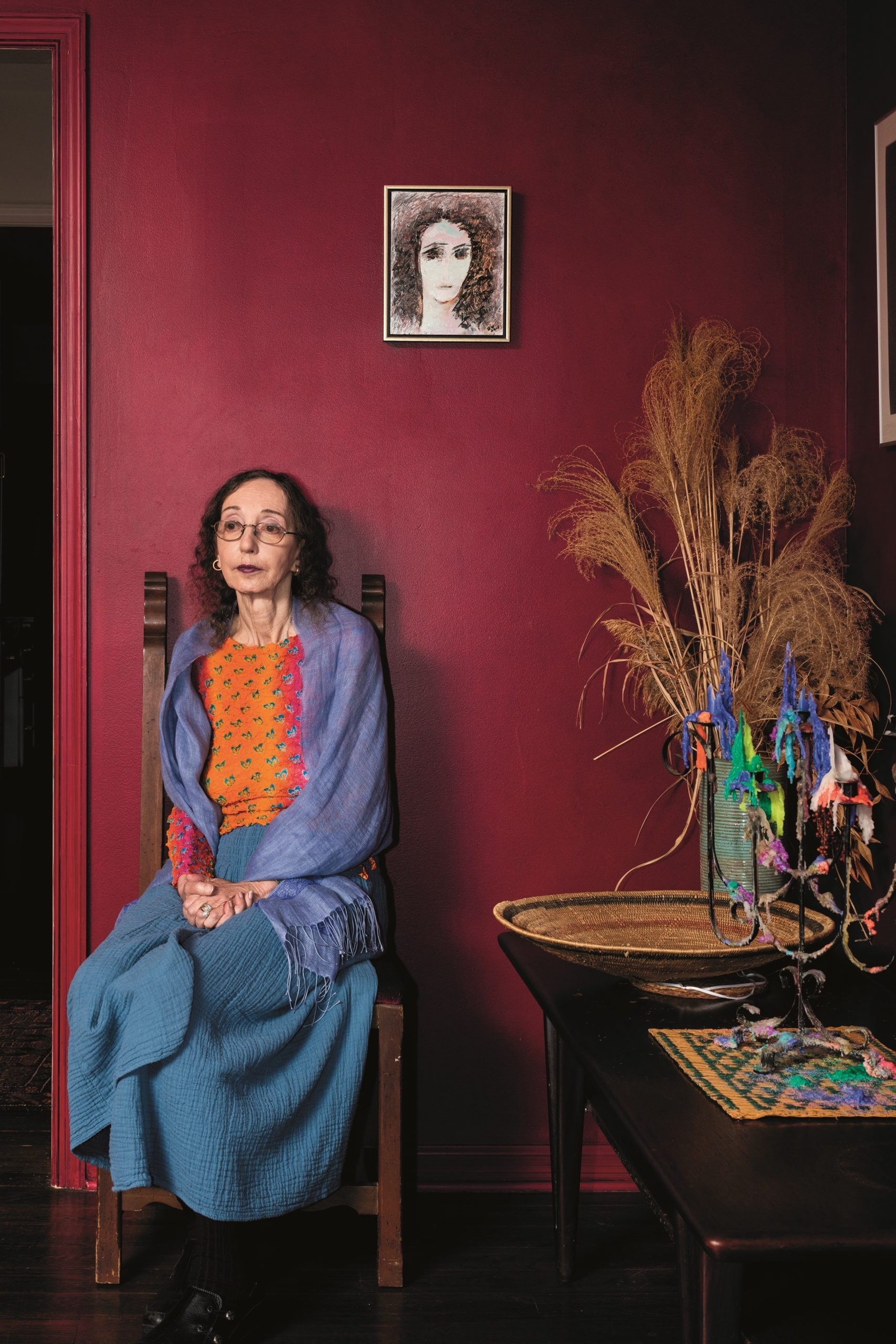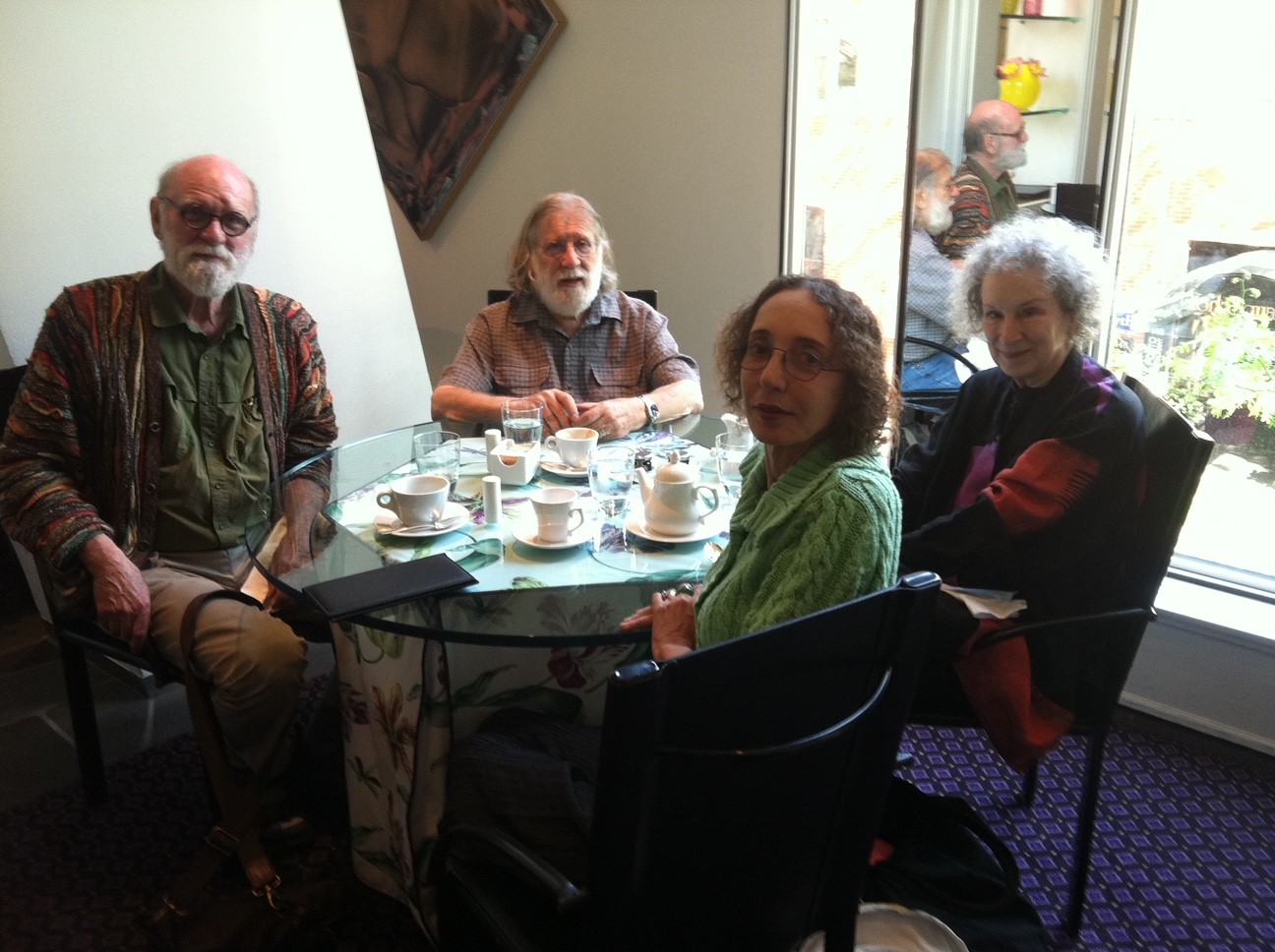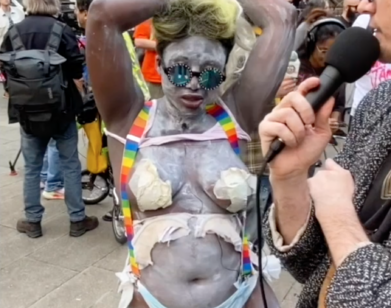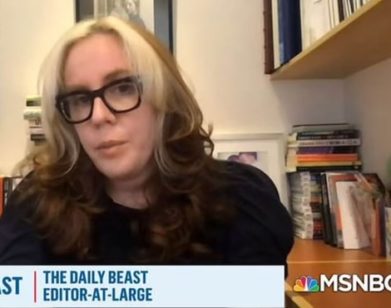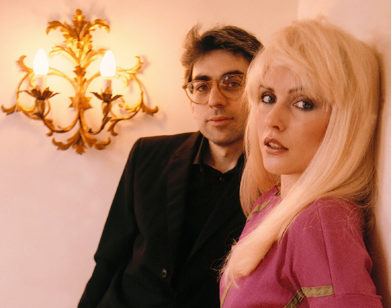LIT
Joyce Carol Oates and Margaret Atwood on All Things Evil
If you google “female authors,” two of the first names that pop up are Margaret Atwood and Joyce Carol Oates. That’s no surprise–the pair are some of the most renowned and prolific authors writing today, gender notwithstanding. Books like Atwood’s The Handmaid’s Tale and Oates’s Blonde are some of the most beloved and talked-about novels of the past 50 years, and remain shockingly relevant today, with buzzy adaptations and legions of fans. Oates’ new novel Babysitter toes the line between fiction and true crime, placing its protagonist Hannah Jarrett, a privileged married woman who begins a dangerous affair, in the center of an affluent Detroit suburb plagued by the real-life serial killer in the late 1970s. To mark its release, Atwood and Oates, who go way back, took some time to chat about witches, lobotomies, and why they’re not giving up on America. —CAITLIN LENT
———
JOYCE CAROL OATES: My household emergencies are all taken care of.
MARGARET ATWOOD: That’s good.
OATES: We don’t have to go into the details, but there was a snake loose in the house. Now the snake is caught.
ATWOOD: Was it a small snake?
OATES: It was a very small snake. But creepy and slippery.
ATWOOD: Joyce, that kind of thing shouldn’t put you off—you write gothic!
OATES: Well, I didn’t stay out in the woods as much as you did.
ATWOOD: Probably not. But here is your new book. It’s called Babysitter and it’s on sale in August, which is coming up very quickly, and you gave me nightmares. It’s set in Detroit of 1977. It’s a love song to Detroit, but a rather dark love song.
OATES: The novel’s background is fairly authentic. There was a serial killer who was known as The Babysitter who was active at the time when my husband Ray and I were living in Detroit. There was an organization I belonged to called the Detroit Women Writers Association. These women were suburban wives and mothers, but they were also writers. I learned a lot about the suburbs of Detroit, which fascinated me. Then in 1976 or 1977, these killings began to take place. They were children who were vulnerable, who might have been going to the drugstore or hitchhiking on Woodward Avenue. I tried to write about what it’s like to be in the middle of something.
ATWOOD: Yeah, start in the middle. As you know, that’s how the Iliad starts.
OATES: We all have a vague idea of a destination, but we don’t know how we’re going to get there.
ATWOOD: Yes, and even the destination can be open ended, as it is with your book—not to give away anything. This book actually made me feel quite anxious.
OATES: I was living in Detroit and you were in Toronto at that time.
ATWOOD: I was on a farm in Ontario in the ‘70s.
OATES: Oh, you were?
ATWOOD: You know I spoke to you from that farm. I remember being in the sunroom talking to you, remember that?
OATES: Yeah, and then I moved to Windsor, Ontario. That’s a part of my life that I feel very sentimental about. But this is about the Detroit part of my life. Everything was very heightened. There’s an antic feel. I was so haunted by that city. It’s very deeply imprinted in me right now, like a dream.
ATWOOD: Detroit’s changed a lot, but that point was Detroit’s heyday. It was really rich, it was powerful. It was Motown, it had lots going on. But it wasn’t New York. [Women] were still expected to be adjuncts; they were expected to be the wife.
OATES: It’s still true now. There’s just a little cutting edge of people who are feminists, but If you just look at America, right now, which maybe we don’t want to do, you can see that there has been very little progress.
ATWOOD: I wouldn’t say that, that’s a little negative. There’s been a lot more progress than there was in 1955.
OATES: That’s true but, as I said, the last time we spoke about America, you made your point about Gilead and you made it very well. Because we have it here. It’s enough to write dystopias, we don’t want to live in them.
ATWOOD: Of course not. And we’re not there yet, because if we were there, you and I would not be having this conversation. You’d be in a dungeon, Joyce. I’m not giving up on the United States so easily. Some people are really fighting tooth and nail to keep from sliding back into the 17th century, because the other people seem to wish to live under an absolute monarch. The Murdoch empire has now decided that Trump is unfit for office, so let’s see how that plays out.
OATES: Too little too late. But I guess it’s never too late.
ATWOOD: That’s the spirit!
OATES: But to talk about Babysitter a little, what I was trying to evoke is the sense that something malevolent is playing out right while you’re in it. There really was a serial killer. He was never apprehended, and he seems to have committed suicide in the novel.
ATWOOD: It didn’t sound like a suicide to me, the one in the novel is more successfully staged than the real life one.
OATES: I did research into the Babysitter years after I left the area. I don’t want to sound conspiratorial, but there are pedophile rings. I discovered years later that the Babysitter was either in one of those assemblages of predators or known to them, and somebody probably knew that he was the Babysitter. There is this phenomenon of people who know and don’t do anything about it.
ATWOOD: Possibly because they themselves are implicated.
OATES: There are people who don’t want their relatives to get in trouble. There are people with money, who can pay the authorities off. They can always make bail. There’s a whole gray area of people who enable horrible criminals like Jeffrey Epstein. I even know in New York, people are two or three degrees removed from Epstein. They’re “nice people,” but they’re not confronting this reality.
ATWOOD: Who knew what is always an interesting question. Who knew what, when.
OATES: With Harvey Weinstein, too.
ATWOOD: A lot of people knew about that.
OATES: Very many reputable people knew about it, but pretended not to. So I always like to write about degrees of responsibility. There are criminals and violent, sociopathic people, but then there’s this other larger group of others who are just not doing anything about it.
ATWOOD: But you can’t move against people like that legally unless you’ve got the evidence.
OATES: That’s right.
ATWOOD: There are a lot of people who go, “Well we’ve heard that, of course, but it might be just a rumor.” Unless somebody is willing to get the actual evidence in some way or another, nothing’s going to happen, because nothing can happen.
OATES: Well, people like Weinstein and Epstein have a lot of money, and they can sue you for saying what is actually the truth.
ATWOOD: They can, but they’re not going to succeed if you’ve got the documentary evidence.
OATES: But it’s not that easy to get it.
ATWOOD: That’s what the Epstein book and Weinstein book demonstrated.
OATES: There are libel laws in England that are very problematic, because even though you may be telling the truth about somebody, that person can sue you.
ATWOOD: In Canada, truth is an absolute defense against being sued for libel.
OATES: That’s so Canada. No ambiguity.
ATWOOD: If I say you’re a serial killer and I can prove it, I’m not libeling you.
OATES: That’s very sensible.
ATWOOD: Anyway, your heroine made me very anxious. It’s like those Gothic horror movies, when you say, “Don’t open the door, don’t go into the crypt, no, don’t go there,” and they do. So, you see her just getting deeper and deeper into her own fantasy life and nightmare.
OATES: She’s living in the suburbs and her whole life is like a calendar. I have my own calendar right here, and I’m sure you have one, too. But then she breaks free. As it turns out, she probably shouldn’t have done that.
ATWOOD: No, she shouldn’t have!
OATES: But on the other hand her life was very stalled. Margaret, let’s look at this as a symbolic journey. You can live a life that’s peaceful and not tormented, or you can write a novel. Hannah’s journey is very much like my own experience. I started writing this at the beginning of the pandemic. I would be awake much of the night just staring into space and wondering what was happening. We were in lockdown in New Jersey, so I transcribed into the novel that sense of forward propulsion, of not knowing where you’re headed. Each day seemed like a nightmare, but at the same time I was trying to be rooted.
ATWOOD: [Hannah] has a nightmare of running, running, running, and not getting anywhere.
OATES: In her high heeled shoes, which I don’t wear. Back in 1977, were you wearing high heeled shoes?
ATWOOD: No. I was on a farm. I was wearing work boots.
OATES: When you came into the big city of Toronto, people got dressed up. You probably wore some little heel.
ATWOOD: A little heel, yeah.
OATES: I did, all my friends did. Much of my sympathy really is with Hannah. She was like the women I knew. They were very nice women, and they wanted to be good mothers. But they were deeply bored with their lives, very constrained. They had a good deal of money, their husbands were executives or lawyers or doctors, but their intelligence was underutilized.
ATWOOD: We heard a lot about that from Betty Friedan in the early ‘60s. Put the women in their houses, with their labor saving appliances and their children, and tell them that the meaning of life was to be totally devoted to the husband and family. They were quite frequently college educated women who were then told that the reason for their education was so they could make intelligent dinner table conversation with their husband’s business associates.
OATES: Well, women couldn’t really own property. Husbands could commit their wives to mental institutions. I’m doing the research right now that you would just love. I’m looking into early 19th century mental institutions, the so-called “mad houses” and “lunatic asylums.”
ATWOOD: Yes, I’ve been there because of Alias Grace.
OATES: That’s right. Well, about 15 miles away from here in Trenton there was the New Jersey State Asylum for Female Lunatics. This was 1840, but the word “female lunatics,” there’s no euphemism there.
ATWOOD: You’ll be happy to know that the two main reasons for people getting put into it were extreme alcoholism giving rise to violence and hallucinations and “religious mania.” So, usually you got put in by your family if you were out of control. You could get your wife committed with the say of just two doctors, and that was easy to arrange.
OATES: Well, during my own lifetime, particularly the lifetime of my first husband Ray, it was not unknown that lobotomies were performed on adolescent girls. They might have been sexually rebellious or just didn’t want to go to church. And in my first husband‘s family, there was a girl, who was about fifteen. They thought she was possessed by demons or some crazy thing, but when I looked into it, it just seemed that she was a nonconformist. She was given a lobotomy and was then mentally incapacitated for the rest of her life.
ATWOOD: You know, if you look into the history of lobotomies, the guy who “invented it” just stuck an ice pick in between your eyes. There wasn’t anything refined about it, and people just let him do it.
OATES: He could do about 30 of them a day. He won a Nobel Prize for that.
ATWOOD: He won a Nobel Prize?
OATES: Yeah. I wrote a novel called Zombie, which very much has all that in the background. I’m interested in scientific malpractice and misconduct. The history of science is basically a history of misconduct.
ATWOOD: Well, we’ve wandered off the path, so back to Babysitter. It’s really about Detroit at a certain period of time, but it’s also about theories of women’s lives, like what ought to make you happy.
OATES: [Hannah] is almost like a sleepwalker. I identify with her a good deal. I think of life as being very reflective even though I’m in the historical present, and perhaps it’s the same with you. I don’t remember being so retrospectively absorbed when I was younger, but it seems to be something that’s happening more now.
ATWOOD: When you’re younger you don’t have a lot of past to be retrospective about. Young people can imagine what it’s like to be older, but older people know what it’s like to be younger.
OATES: But you feel that you’re the same person.
ATWOOD: Yes, and no.
OATES: How old do you feel that you are?
ATWOOD: I don’t think in those terms. I think in terms of stages. I would say that we are at the retrospective stage.
OATES: I still feel I’m about 14 years old. I feel that I’ve always been at the margin of everything. When I walk into a library, I remember when I was a girl, seeing these shelves of books. Just like a wonderland or a treasure trove. But if I walk in a library now, I can find my own name there. It seems like some strange violation of the norm.
ATWOOD: Do you still think that?
OATES: Yeah, I do. And when I teach, which is quite often, I identify with my students. I don’t identify as the professor. I started college in 1960. At the height of irony.
ATWOOD: Those were the days when you couldn’t wear trousers to college, Joyce. You had to wear a skirt.
OATES: Well, we were at Syracuse and it was cold with such horrible weather. We were allowed to wear slacks.
ATWOOD: Were you? I find that extremely advanced.
OATES: Did you ever get into Lamont [Library at Harvard University]?
ATWOOD: It was forbidden. It was a male undergraduate library and had all the modern poetry in it. You can get a book out of it, but you had to know what book you wanted and then get out. Instead I hung out in the Weidner stacks, in the Demonology and Witchcraft section.
OATES: Look what that did for you.
ATWOOD: I know! It was all very instructive. They had this little Canadian literature section that somebody must have collected for some years, and then died, because it stopped abruptly.
OATES: You wrote a story called Hair Jewellery.
ATWOOD: I went to Salem for that.
OATES: You don’t have that many stories set in the United States. Except maybe Handmaid’s Tale. But Hair Jewelry is so evocative of that place.
ATWOOD: At that time they weren’t making that much of it, but they have really gone whole hog into their witchy past. They now have emporiums.
OATES: Witches are certainly misunderstood, the whole idea. It’s the demonization of women. Men make up all these demonic forces and project them onto these poor women and they really just want to evict them, kill them, and take their property.
ATWOOD: These were Puritans.
OATES: I know, but look at the Puritans in this country today.
ATWOOD: Those are not real Puritans. If they allow themselves to be bribed then they’re not real Puritans.
OATES: Thank goodness we’re not in that world.
ATWOOD: Well, yeah. Let’s not return to it.
ATWOOD: So if you had a choice between a corrupt regime where bribery is possible, or a puritanical regime where it is not possible, which would you choose?
OATES: A corrupt one, because we are living in the corrupt one right now and we know how to navigate it.
ATWOOD: Well, some people do.
OATES: If it’s somebody like Trump or his cohort, they’re mobbed up. You pay your bribe to this person somewhere or to some judge. You can do it if you spend some money. You have a chance in a corrupt regime, whereas with the zealots and the puritans you don’t have a chance.
ATWOOD: That would be my point. But I think you’re wrong about Trump. I think he’s both.
OATES: But to think of him as a true believer, or a zealot, I don’t know.
ATWOOD: I don’t think he’s a true believer in anything except his right to be top of the heap.
OATES: He’s a narcissist. He’s a pawn.
ATWOOD: The only person who ever really played him was Vladimir Putin.
OATES: After the idealism of the 1960s, the 1970s were a time of drugs and a good deal of cynicism. I remember that the Vietnam War had ended, but the bitterness and confusion and sense of division in America persevered for a long time afterward. My novel actually was evoking that era.
ATWOOD: Alas, it is quite divided now and it drives me crazy. I don’t think the next in line is going to be better. In fact, it is probably going to be worse. So why is America tearing itself apart and throwing itself away? I would like to know.
OATES: The short answer is that there are very, very wealthy people and corporations in America. They don’t want to pay any income tax. Populism is just this device of demagoguery where you get naive people to vote against their own self interests. You wave this flag and say, abortion is evil, so they rush out and they vote for your candidate who, incidentally, is for the lowest possible taxes.
ATWOOD: Why do we not have funerals for fertilized eggs that are left over from in vitro? And if embryos are people, they ought to have inheritance rights. It’s illogical.
OATES: The people who are talking about this aren’t just hypocrites, they don’t believe it for a second.
OATES: So Margaret, what are you working on? Are you working on a novel?
ATWOOD: No I’m not, I’m just finishing the proofreading on a book that we’re about to announce.
OATES: Well, you and I are the only ones who know here. We’ll leave that a secret.
ATWOOD: We’re not live streaming.
OATES: Well, Margaret has written a weird very weird little thing that you’ll find out about later.
ATWOOD: It’s a story collection called Old Babes in the Wood. And it’s coming out in March of 2023.
OATES: I think I read that in the New Yorker?
ATWOOD: You did read that in the New Yorker.
OATES: It’s a lovely heartbreaking story. I feel that I know that cabin, even though I’ve never been there.
ATWOOD: Thank you so much. I think we’ve given our interview.
OATES: I think so.
ATWOOD: Have a wonderful rest of your day. I hope no more snakes get into your house.
OATES: Thank you, bye bye!

